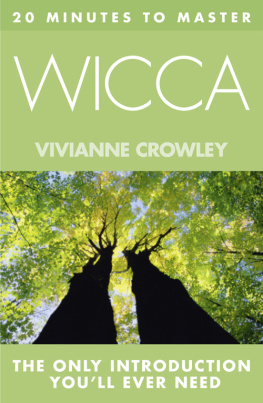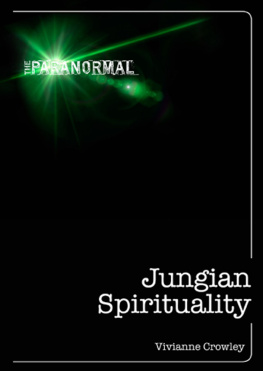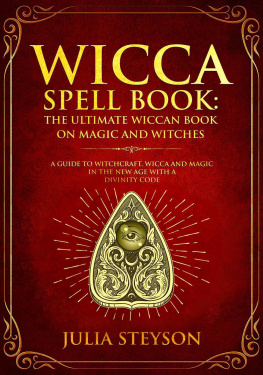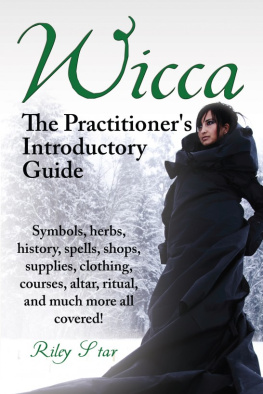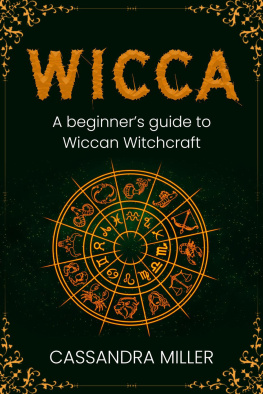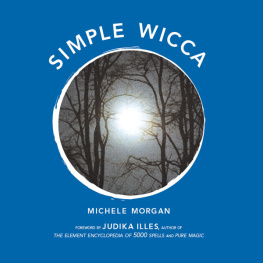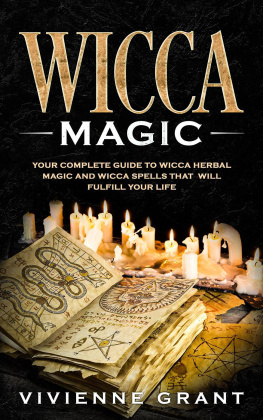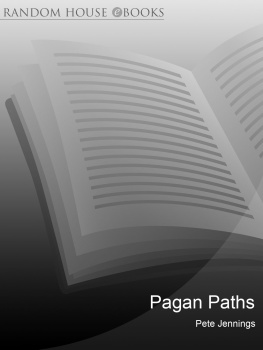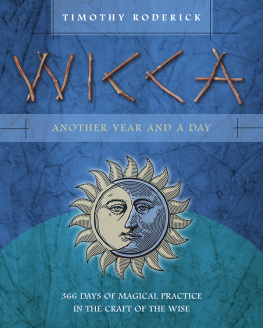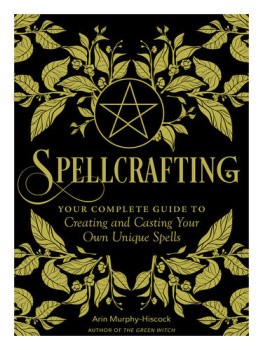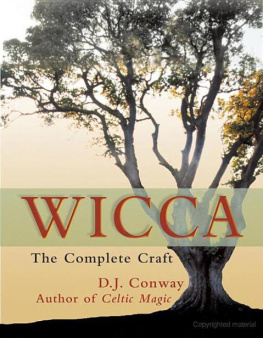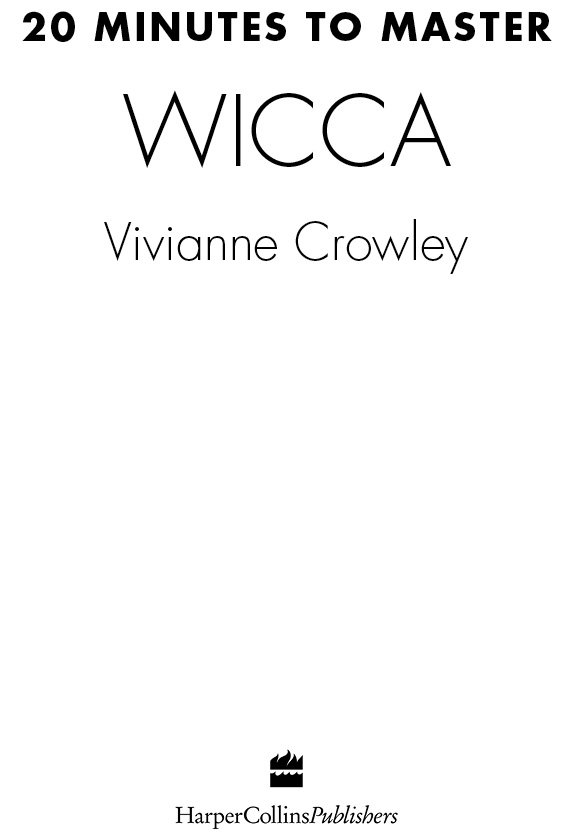This book is for those who would like to know more about Wicca and for those who would like to try Wiccan practice for themselves. Often Wicca is a group activity and a book such as this cannot pretend to teach a would-be Witch everything he or she wants to know. However, it is a starting-point which will allow you to explore for yourself some of the basic practices and concepts of Wicca. From here, you can decide whether it is something which you wish to pursue further or to integrate into your life.
Whatever you decide, learn and enjoy.
CHAPTER 1
If you go down to the woods today, you may have a big surprise. In deep forests and grass-clad clearings, you may find covens of Witches worshipping the ancient Pagan deities of their lands and peoples; chanting, drumming, feasting and rejoicing in the life that the Gods have given us. They may be making magic to heal the Earth or those that are sick; they may be practising the ancient arts of divination. They may be practising Wicca, the ancient art, craft and religion of Witchcraft.
Today, the words Wicca, Shamanism, Witchcraft, Witch, Wise Woman, Cunning Man, Magician are often heard; but what do they mean? Wicca is the religion of Witchcraft. Witchcraft is not merely a system of magic. Within the Wiccan community, Witchcraft has a capital letter and is used in a special sense. Wicca is a Pagan mystery religion of Goddess and God. It is also a Nature religion. It is not a remnant of the past and of the sixteenth- and seventeenth-century Witch trials. Ancient though the roots of this tradition are, it is alive and well in the world today.
My own Wiccan training was primarily in Britain, but since then I have worked with Witches in North America, Australia and all over Europe. Each country has its own Witchcraft traditions. These draw primarily on European traditions, but in the case of the United States, for instance, they are influenced by Native American spirituality and by West African traditions. Wicca is therefore a synthesis of a number of different belief systems that have endured into the modern age because they are relevant to our needs today.
The word Wicca itself is derived from the Anglo-Saxon word Wicce, a Witch. Originally this was pronounced Witcha, but in modern times it is pronounced Wicka. The word Witch is a difficult one. It conjures images of the dark, the hag-like, the forbidden; the three Witches in William Shakespeares play Macbeth; black candles, broomsticks, poisons, wax images with pins, incantations, hubble, bubble, toil and trouble, cauldrons, graveyards; many suspect things. There is also the image of the Witch as a vampire: a strong woman using her sexual energy to lure men into her power; just as in Greek myth the Witch Circe turned the hero Odysseus men into swine.
Positive images of the Witch are more difficult to find, but they are there in folklore and childrens stories. There is the user-friendly granny a nice elderly lady with silver-grey hair who lives in a cottage in the middle of the wood with a big black cat curled up by a warm fire. She is the fairy godmother whose magic wand heals all ills. There is the occasional TV Witch. Some people may remember or have seen re-runs of the television series Bewitched. This was one of my favourite television programmes as a child, but I could never see why the lovely Witch Samantha had married boring Darren or why she objected to doing housework by nose twitching. It seemed a very sensible idea to me.
Some Witch images are positive, others negative; but they have common threads. These give us the first clues on our quest to discover who and what Witches really are: the Witch is a magic-maker and Witches worship a Goddess the Great Mother Goddess. They also worship the Horned God. In Greek mythology he is Pan and, to the Celts, Herne or Cernunnos. In other words, Witchcraft is a religion. It is a pre-Christian religion originating in the mists of time. It is based on remnants of simple Pagan traditions handed down in folklore and country custom. Onto these have been grafted more sophisticated beliefs from the more formal Paganisms of Rome, Greece and Egypt, and from the initiatory mystery traditions. Wicca involves the development of magical psychic powers, but hand in hand with the wisdom to use them. An initiatory system of spiritual development is an intrinsic part of the tradition.
WHO ARE TODAYS WITCHES?
Who are they, these people who call themselves Witches, who walk the ancient ways, who work the traditional magics, who speak once more to long-silent Goddesses and Gods? They are men and women of all nations and races. They are young, old, rich, poor. They are those who have woken up to the fact that material creation is not the be all and end all; that science does not have all the answers; nor do the so-called world religions. They have remembered something which many of us have forgotten. Partly it is ancient wisdom; partly it is common sense.
People come to Wicca for many reasons. Some seek occult power and knowledge. Some are drawn to Wicca by feminism and the role of the Goddess; others by ecological awareness and reverence for Nature; still others seek spiritual transformation.
Magic is an attraction for some. Gerald Gardner, one of the founding fathers or revivers of modern Wicca, once wrote:
Witchcraft was, and is, not a cult for everybody. Unless you have an attraction to the occult, a sense of wonder, a feeling that you can slip for a few minutes out of the world into the world of faery, it is of no use to you.
Many people come to Wicca because they already see themselves as Witches. We may have had a sense of an inner power that had no name; a sense that just beyond the realm of sight and sound and touch there dwelt another kingdom the Land of Faery. Perhaps we went there in our dreams.
Some of us were aware that some of this Faery Power dwelt within us. Perhaps we had precognitive dreams. Sometimes we knew the future. We may have tried to develop this by working with tarot cards and telling the fortunes of our friends. Perhaps we were scared when our predictions came true and stopped looking into the misty glass of the future. Perhaps we found we had the power of small magics. We could wish for something very hard and it would come true. Perhaps we found books of spellcraft on the shelves of our library or bookstore and tried them. Maybe when we talked to our relatives we found that some of our family had the

